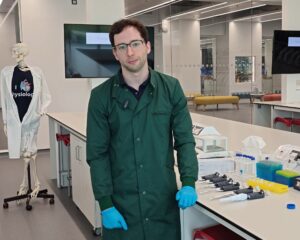
Dr Cameron Malcolm
Physiology Lecturer
University of Aberdeen
Dr Cameron Malcolm is a Lecturer in Physiology at the University of Aberdeen. In 2014 Cameron came to Aberdeen to study BSc (Hons) Pharmacology at the University of Aberdeen for which he was awarded a 1st class honours degree. During his undergraduate studies Cameron was awarded a Teaching Development Bursary (2017) and carried out his honours project at Robert Gordon University under the tutelage of Professor Cherry Wainwright and Dr Sarah Walsh. Upon graduating Cameron stayed at the University of Aberdeen and began his PhD research on the orphan receptor GPR75 in the lab of Dr Fiona Murray as part of the EastBio Doctoral Training programme. On completion of his PhD research Cameron joined the therapeutic biologics company Elasmogen Ltd. and worked in the Auto-immune Inflammation Team and then in the widening access field as part of AspireNorth before returning to the University of Aberdeen to take up his current position of Lecturer in Physiology.
Read the first instalment of Cameron’s Early Educator Series.
Gaining physiology teaching experience – From secondary school teaching assistant to lecturer in physiology
Hockey and coaching advise
I began accumulating teaching experience during my own time in education. In my final year of secondary school I acted as a teaching assistant for a chemistry class during which I predominantly assisted students with additional support needs, drawing upon work I had done with Dyslexia Scotland. After leaving school with grades that I was disappointed with, I took a gap year. I used this year to improve my grades by taking distance learning courses at Inverness College, gained experience working at a Veterinary Clinic and in my spare time helped coach the hockey team from my former High School. Although not an academic education experience, it was during this coaching position that my own former coach (and geography teacher) suggested that I pursue a career in teaching based on how he saw me coaching the team. This combined with the feedback and enjoyment I had received from my time teaching in the chemistry class planted the aspiration of a teaching career in my mind. This positive feedback was particularly impactful as it came at what had been feeling like a dark time, with friends off at university, not getting into the course I had originally aimed for, and up until that point being unsure of what new path I would take going forward.
Game plan for a career in education
The following year I started an undergraduate pharmacology degree at the University of Aberdeen, which is where my teaching journey in physiology began. The university environment benefited me greatly as a learner. As mentioned I left school with disappointing grades and never felt I was reaching my potential but at university I thrived, and the hard work I was putting into my studies was now being represented in improved outcomes. In the summer between my 3rd and 4th years of my degree, I was awarded a medical education teaching development bursary to carry out a summer project working with Professor Derek Scott who is someone who has continued to act as a mentor to me throughout my career.
During this project I produced demonstrational videos and online game style resources to aid honours students in their objective structured practical exam (OSPE). The OSPE is an assessment where students carry out degree specific practical skills at six successive stations within a prescribed time limit. The feedback from students following the use of these resources was overwhelmingly positive and was identified in student feedback as being a highlight of the course. These resources are still being used by physiology students at the University of Aberdeen, as well as by students on other degree programs. This initial project developed into a long-standing involvement in the development of the OSPE at the University of Aberdeen as I was involved in organising, teaching and marking the OSPE alongside carrying out my PhD research. My involvement in the OSPE project, the enthusiasm and drive I felt to create the best resources for students I could, along with the guidance I received from Professor Scott, was what set me down the path of physiology education.
Going the distance
I have presented the methods, outcome and impact of the OSPE and the associated resources at various conferences over the years, the first of which was Europhysiology 2018. This was my first conference. Attending the pedagogy focused sessions and learning about the ever-increasing toolbox of methods used to teach complex topics really cemented my ambition to be involved in physiology teaching.
After carrying out the OSPE project my goal of a career in physiology teaching was set in my mind and the next step for me was to carry out a PhD degree. In applying for PhD studentships, I found that not every academic valued teaching as much as myself or my mentors. In one meeting for a project that I had intended on applying for I was posed a question along the lines of “What are my career goals?” to which I replied that “I intended to stay within academia… I had a particular focus on the education side of things” at which point I was bluntly told “Under no circumstance should you ever mention that you are interested in teaching in any interviews for a PhD. You will never get a PhD if you say you are interested in any aspect other than the research”. I did not apply for that particular PhD project. It did highlight the challenge we still face in the medical science field that education is still not properly valued by all.
Fortunately, I carried out my PhD research in the lab of Dr Fiona Murray at the University of Aberdeen and benefited from a supervisor who, aware of my teaching focused aspirations, let me take a large role in supervising honours and masters students and helped me develop these skills. A personal point of pride is that the majority of students I have helped supervise have continued in the field of medical sciences, most progressing into carrying out PhD research. I found this an encouraging indicator that, at the very least, my enthusiasm for physiology contributed to keeping talented young researchers in this field. Alongside my PhD, I took any and all lab practical demonstrating opportunities which gave me the chance to teach using the Lt learning platform and AD instruments powerlabs. During the COVID-19 lockdown, when students were unable to carry out in-person practical lab classes, I created video teaching resources to substitute for these lab classes that were used across undergraduate and postgraduate medical science courses at the University of Aberdeen.
Achieving the goal
On completing my PhD research, I took a job within the drug discovery industry for two years, where I began building up a pool of experience that I could draw upon to contextualise the material I would, hopefully, someday teach. During my time in this role I stayed connected to medical science teaching by taking part in school outreach, both in my drug discovery industry capacity and as an invited alumni at University of Aberdeen “So you want to be a Medical Scientist?” events for school pupils.
Between my time in drug discovery and starting in my post as a lecturer in physiology I was fortunate to be able to spend three months working with Aspire North. Aspire North is a widening access programme that supports young people from underrepresented backgrounds in higher education (low income, rural, care-experienced, etc.) to explore and pursue higher education. Through workshops, mentoring, and tailored guidance, the program helps pupils build confidence, interview technique, application skills and understand their options for life after school. My time working in widening access has provided me with an awareness of articulation routes into higher education and of the challenges that those from a care-experienced, low-income, young carer or refugee background face in higher education. My awareness of these challenges will hopefully prove to be useful in making sure I can provide, or signpost to, the right support for physiology students navigating these difficulties.
Cameron’s Early Educator blog series will return at the end of semester one with a recap on how he prepared for his first-term of teaching, how the teaching went, as well as an account of the challenges that arose.
Help shape the future of Early Career Educators
Are you interested in helping shape the experiences of future Early Career Educators and/or share your own experiences? If so, please spare 20 minutes of your time to help improve the experiences of current and future Early Career Educators. The Physiological Society have agreed to help disseminate and publicise this work. You can read the participant information sheet and then get involved in the research project by either following this link (https://tinyurl.com/ECESurvey25) or by scanning the QR code below.


